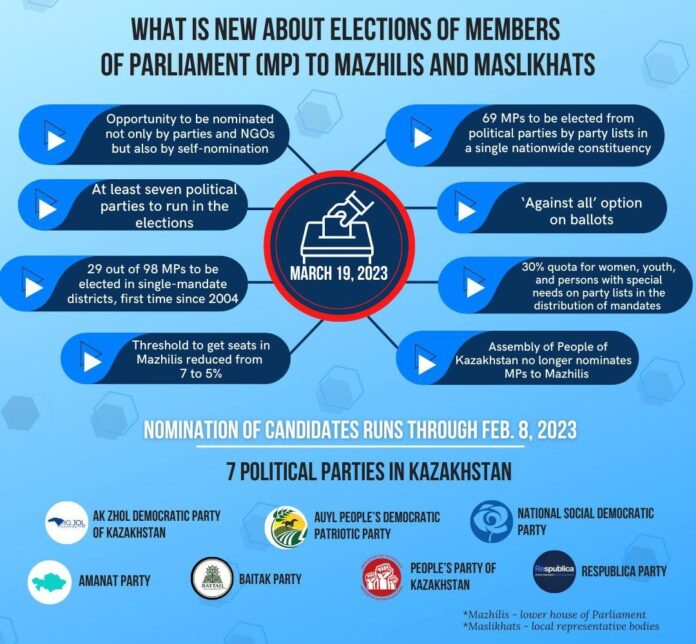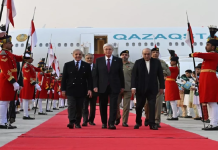Author,Fahad Ahmed Misson
The start of this year could not have been any more different for Kazakhstan when compared to the tragic January of 2022. Just over twelve months ago, the country was amidst a violent coup attempt orchestrated by groups that wanted to see the nation collapse. There was a real possibility that Kazakhstan’s statehood would fall apart from within, which would have had reverberating consequences well beyond Central Asia.
Fortunately, the country managed to not only recover from the wounds of January 2022 events but to further strengthen the foundations of governance through political and socio-economic changes. Fast forward twelve months from January 2022, and the country is quite unrecognisable. The constitutional amendments that were implemented following the nationwide referendum in June 2022 have ushered in new democratic principles in the country, including a more influential parliament, limited presidential powers, simplified procedures for registering new political parties, direct elections of akims (mayors), among many other important measures.
Several political initiatives have launched from January this year. Perhaps most significant is the establishment of the Constitutional Court, to which every citizen can apply, including the Commissioner for Human Rights and the Prosecutor General. The Court will ensure that the country’s laws are in line with the Constitution and will protect the fundamental rights of their citizens. Elvira Azimova, the first Chairperson of the Constitutional Court, previously worked as Commissioner for Human Rights in Kazakhstan. This is a clear indication of the Court’s priorities and direction.
Now, Kazakhstan is moving fast towards Mazhilis (the lower house of parliament) and maslikhats (local representative bodies) elections on March 19. These elections will be unique in many respects.
Firstly, two recently established political parties will participate in the vote. For instance, towards the end of last year, the Green Party was established in Kazakhstan, which will raise awareness of ecological issues – an area that is of vital importance due to the ongoing climate change challenges. And the Islamic Republic of Pakistan is no exception.
As a result of a major flood in the history of Pakistan, which occurred in the summer and autumn of last 2022, more than 30 million Pakistani citizens were left homeless. The damage caused to agricultural land, livestock and urban infrastructure is a direct evidence of the relevance of the environmental agenda.
Overall, seven parties are now registered in the country offering a plethora of political choice for the electorate. Their participation in competitive elections will further contribute to strengthening a multi-party system by increasing plurality and influence of opposition politics, an objective which the country has been working towards for the past several years. Significantly, the threshold for parties to enter the Mazhilis has been reduced from seven to five percent, making it easier for opposition parties to enter parliament and play an important role in increasing government accountability.
Secondly, a mixed proportional-majoritarian model will be used for the first time for the election to the Mazhilis since 2004, where 70 percent of deputies will be elected proportionally from party lists, and 30 percent by majoritarian rule from single-member districts. This means that 29 out of 98 members of parliament will be elected in single-mandate constituencies, while 69 will be elected from party lists under the proportional representation model from a single nationwide constituency. The elections to the maslikhats of districts and cities of national importance will also be held under a mixed electoral system, with a 50/50 ratio, while lower level maslikhats will be elected completely under a majoritarian rule.
In addition, an “against all” option will be included on the ballots, which will give the electorate the opportunity to express their disapproval of all candidates should they wish to do so. Finally, a 30 percent quota for women, youth, and persons with special needs has been established at the legislative level in the distribution of the mandates of the members of parliament from the party lists. This ensures wider representation in parliament of all groups in Kazakhstan.
The country has always shown its commitment to holding free, open, and fair elections. The role of election monitors is undoubtedly crucial in this regard. As with previous elections, including the presidential election in November 2022, They have invited 10 international organizations and scores of observers from foreign nations to observe the election. Kazakhstan expects the largest election observation missions from the Organization for Security and Cooperation in Europe (OSCE) Office for Democratic Institutions and Human Rights (ODIHR) and the Commonwealth of Independent States.
A delegation of observers from the Islamic Republic of Pakistan will take part in these elections for the first time, this visit will contribute to further strengthening the parliamentary dialogue.
As is commonly known, in December 2022, Mr. Yerlan Koshanov, the Chairman of the Mazhilis of the Parliament of the Republic of Kazakhstan paid an official visit to Islamabad for the first time in the history of bilateral relations between Kazakhstan and Pakistan. This visit served as an additional incentive to the development of inter-parliamentary cooperation.
The upcoming elections will mark another important milestone in the development of Kazakhstan’s democracy. Many were unsure whether the country would recover after the unrest in January 2022. Yet they have managed to overcome this hurdle. In addition to demonstrating resilience and stability, they have transformed the country through significant political and socio-economic initiatives.
The elections will not change the country overnight, but they will further contribute to the creation of a Just Kazakhstan – a prosperous society, and a more vibrant, dynamic and competitive political system. Such a country will be an even stronger and more committed partner for cooperation for the international community, including for the Islamic Republic of Pakistan in both bilateral and multilateral formats, primarily in the context of regional cooperation.
As the world continues to navigate current geopolitical and economic challenges, a stable and thriving Kazakhstan is to the benefit of not just their own citizens, but to the whole region and beyond. The political reforms, supported by competitive elections, is the foundation on which we will ensure the stability and continue to build the future of Kazakhstan.
 Author,Fahad Ahmed Misson, is a broadcast journalist at PTV World. He covers defense and diplomacy in Pakistan as well as global affairs. He is currently pursuing his doctoral degree at Quaid-i-Azam University, Pakistan.
Author,Fahad Ahmed Misson, is a broadcast journalist at PTV World. He covers defense and diplomacy in Pakistan as well as global affairs. He is currently pursuing his doctoral degree at Quaid-i-Azam University, Pakistan.






